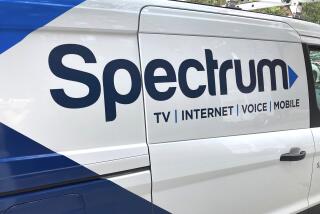It’s bigger.net but Is It Better? Firm Sells $60 Lifetime Net Use
- Share via
In yet another permutation of the wild and woolly Internet market, a new company is offering lifetime Internet use for a onetime fee of $60.
The firm, bigger.net, began offering San Francisco-area customers unlimited lifetime use of the Net on Thursday, in exchange for ads that will appear in a 2 1/2-inch-by- 1/2-inch area on users’ screens. The fee includes a year of electronic mail. After the first year, e-mail will cost $10 annually.
“We want to make the Internet available to people who can’t afford subscription fees of $240 to $360 a year,” said Jeff Fortin, chief executive of the San Jose-based company.
Not that the idea of free or low-cost Internet is new. In a market searching for workable business models, most everything has been tried or is in the process of being tried. In fact, several companies have already offered users free e-mail in exchange for viewing ads.
The most successful is New York-based Juno Online Services, which has 1.3 million users who pay nothing for their e-mail addresses.
While Juno doesn’t offer full Internet access, it is national in scope, allowing users to dial in to local numbers throughout the United States to access the service.
Other companies have tried different routes to use ads to fund Internet services.
Cybermedia pays users--giving them credits to buy goods online--to look at ads. Hypernet pays Internet service providers to run display ads for its service, thereby allowing the providers to offer cheap or free Internet access to their customers.
Nor is lifetime a good measure of how secure a given account is. One flash in the pan was Freemark, which in June promised free e-mail access in exchange for ad space, and then folded in November.
Analyst Emily Green with Forrester Research in Cambridge, Mass., isn’t convinced the bigger.net business model based on ads will work.
The service is currently available only in the San Francisco area, although the company plans operations in Los Angeles and San Diego by the middle of March, and nationwide service is scheduled later in the year.
“It’s not really a good ad buy yet for local advertisers,” Green said. “It’s going to take a number of years before local advertising goes online and can do any damage to the Yellow Pages or local newspapers.”
“The stuff that’s fueling ad growth online right now is national advertising,” she said.
Still, bigger.net is being thoughtful in how it grows.
The company is limiting service to 200,000 people over the next three months to avoid the congestion suffered by AOL after it switched from hourly fees to a flat monthly rate. Use by AOL members has increased so much that the company has asked users to cut back their time online during peak hours until it adds capacity.
Access for bigger.net is currently for computers using Microsoft Corp.’s Windows 3.1 or Windows 95 operating software, but bigger.net plans to add service next month for Macintosh users.






